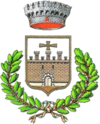Sorano
| Sorano | ||
|---|---|---|
| Comune | ||
| Comune di Sorano | ||
 |
||
|
||
| Location of Sorano in Italy | ||
| Coordinates: 42°40′55″N 11°42′54″E / 42.68194°N 11.71500°ECoordinates: 42°40′55″N 11°42′54″E / 42.68194°N 11.71500°E | ||
| Country | Italy | |
| Region | Tuscany | |
| Province / Metropolitan city | Grosseto (GR) | |
| Frazioni | Castell'Ottieri, Cerreto, Elmo, Montebuono, Montevitozzo, Montorio, San Giovanni delle Contee, San Quirico, San Valentino, Sovana | |
| Government | ||
| • Mayor | Pierandrea Vanni (since June 2004) | |
| Area | ||
| • Total | 174.60 km2 (67.41 sq mi) | |
| Elevation | 379 m (1,243 ft) | |
| Population (2001) | ||
| • Total | 3,955 | |
| • Density | 23/km2 (59/sq mi) | |
| Demonym(s) | Soranesi | |
| Time zone | CET (UTC+1) | |
| • Summer (DST) | CEST (UTC+2) | |
| Postal code | 58043 | |
| Patron saint | St. Nicholas | |
| Saint day | December 6 | |
| Website | Official website | |
Sorano is a town and comune in the province of Grosseto, southern Tuscany (Italy).
It as an ancient medieval hill town hanging from a tuff stone over the Lente River.
Sorano was probably inhabited by Villanovan culture, but the first historical mentions are relative to the 3rd century BC, when it was an Etruscan city under the influence of the more populous nearby Sovana.
Disappearing from history under the Roman domination, it is again known in 862 when a county was founded by Emperor Louis II, under the Aldobrandeschi suzerainty. The Aldobrandeschi were the most powerful feudataries of southern Tuscany for more than four centuries, disappearing in 1312 when Margherita, son of Ildibrandino, died without male heirs. His daughter Adelaide married to Romano di Gentile Orsini, who added the city to the family fiefs.
The county of Pitigliano-Sorano fought against the Republic of Siena, but was forced to accept its suzerainty from 1417. It regained a full independence in 1556, when the latter was annexed to the Duchy of Tuscany. The fortress, due to its strategic position, was frequently attacked; it was also the seat of fratricidal fights between the Orsini. In 1604, with the death of Alessandro di Bertoldo, it became part of the Grand Duchy of Tuscany.
It became part of the Kingdom of Italy in 1860.
Another castle is in the frazione of Sovana.
...
Wikipedia


